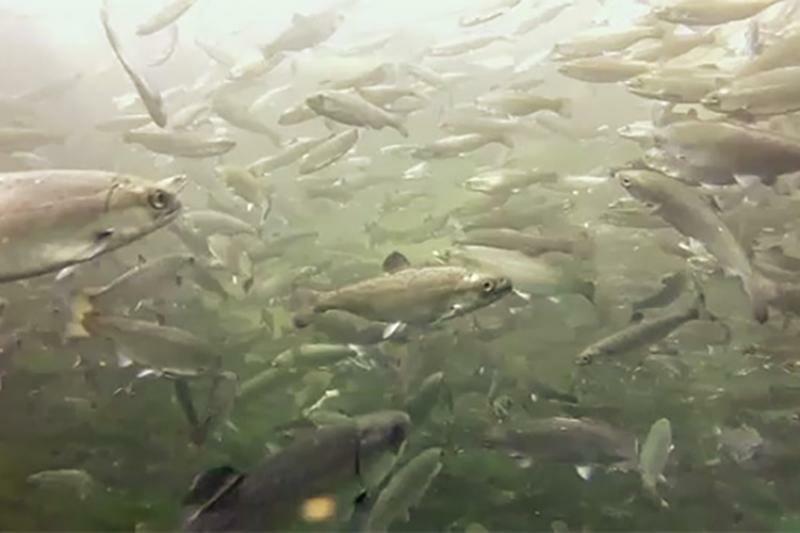The Southeast Alaska chinook troll fishery is under renewed threat of potential suspension, after a federal judge in Seattle ruled the National Marine Fisheries Service must remake its plan for king salmon that allows the fishery to continue employing some 1,500 fishermen.
The long-anticipated May 2 ruling from U.S. District Court Judge Richard Jones requires that NMFS come up with a new “biological opinion” that analyzes the impact of the king salmon fishery on Washington state’s Southern Resident Killer Whale population.
The endangered orca whale population is down to 73 animals. The Wild Fish Conservancy sued over NMFS’ last plan, arguing the agency’s proposed mitigation measures to boost salmon stocks are insufficient to ensure the orcas have enough food to slow their population decline.
A summer salmon season opener July 1 could be in jeopardy from the ruling. NMFS and Alaska state fisheries officials have been preparing for the possibility since an earlier judgement in August 2022 faulted NMFS for failing to meet requirements under the Endangered Species Act. Commercial fishing industry groups said they are looking to appeal the decision.
“The court’s decision is disappointing, not only because it puts the future of Alaska’s small-boat fishing families in jeopardy, but it distracts from the larger, more urgent issues that are causing the continued decline of the Pacific Northwest’s Chinook and orca populations,” said Linda Behnken, director of the Alaska Longline Fishermen’s Association.
“The science and data clearly show that habitat loss, dams, climate change, water pollution, and urbanization are harming salmon and orcas in the Northwest – not our hook-and-line fishery that operates almost 1,000 miles away and has done so sustainably for over 100 years.”
The court order and a fishery closure could immediately boost the king salmon food supply for orcas, said Emma Helverson, executive director of the Wild Fish Conservancy.
“After years of inaction by our federal government to address the prey crisis facing the Southern Residents, Judge Jones’ decision will finally provide starving orcas immediate access to their primary prey,” said Helverson. Closing the fishery “is also helping to recover and restore wild chinook from rivers throughout Oregon, Washington, and British Columbia, essential to rebuilding both populations in the long-term.”
“The Southeast Alaska troll fishery directly employs 1,500 fishermen, with 85 percent of troll fishery permit holders living in Southeast Alaska, and is consistently one of Southeast Alaska’s top three most valuable fisheries, providing renewable income for fishing families living in the region’s rural, isolated communities,” according to a joint statement from the Alaska Trollers Association and Alaska Longline Fishermen’s Association.
“Prized around the world for its premium quality salmon, the troll fishery generates $148 million annually in economic outputs that include restaurant sales, consumer purchases, transportation jobs and other benefits accruing throughout the West Coast of the U.S. and beyond.”
Both associations say they are working with NMFS and Alaska state officials about potential next steps, and planning with their lawyers to appeal the court ruling.
NMFS officials issued a brief statement Friday afternoon about the court decision:
"NOAA Fisheries is aware of the U.S. District Court decision to remand the 2019 Biological Opinion that evaluates the effects of the Southeast Alaska salmon fisheries on threatened and endangered species, and to vacate the Incidental Take Statement for the Chinook summer and winter commercial troll fishery.
"The 2019 Incidental Take Statement that applies to the rest of the Southeast salmon fisheries remains in place. NOAA Fisheries knows these issues are of utmost importance to the communities that rely on the SEAK troll fishery. We are working expeditiously to address the court's order."
The Wild Fish Conservancy contends fewer king salmon have been a key factor in the decline of the Southern Resident orca population from almost 100 animals 25 years ago.
“Research has shown an alarming 69 percent of Southern Resident killer whale pregnancies are aborted due to insufficient chinook salmon and inbreeding depression has been identified as a growing threat to the population’s survival and recovery,” the group says.
Closing the troll fishery “would increase prey availability by approximately 6 percent, which would be enough to stabilize the population and stop their decline toward extinction, though additional actions would be required to begin to grow the population,” the Conservancy says.
Closing the summer and winter Southeast Alaska troll seasons would leave about 172,000 king salmon in the water, the group says.
News of the court order provoked a furious response from the group SalmonState.
“As a wild salmon-focused environmental organization, SalmonState condemns the Wild Fish Conservancy’s misguided, irresponsible litigation — which in all probability won’t save a single endangered killer whale, but will ruin the livelihoods of thousands of Southeast Alaska’s most committed, long-term conservationists and wild salmon allies,” said SalmonState executive director Tim Bristol.
“This is an abuse of the Endangered Species Act by out of touch, ideological, serial litigants.”







